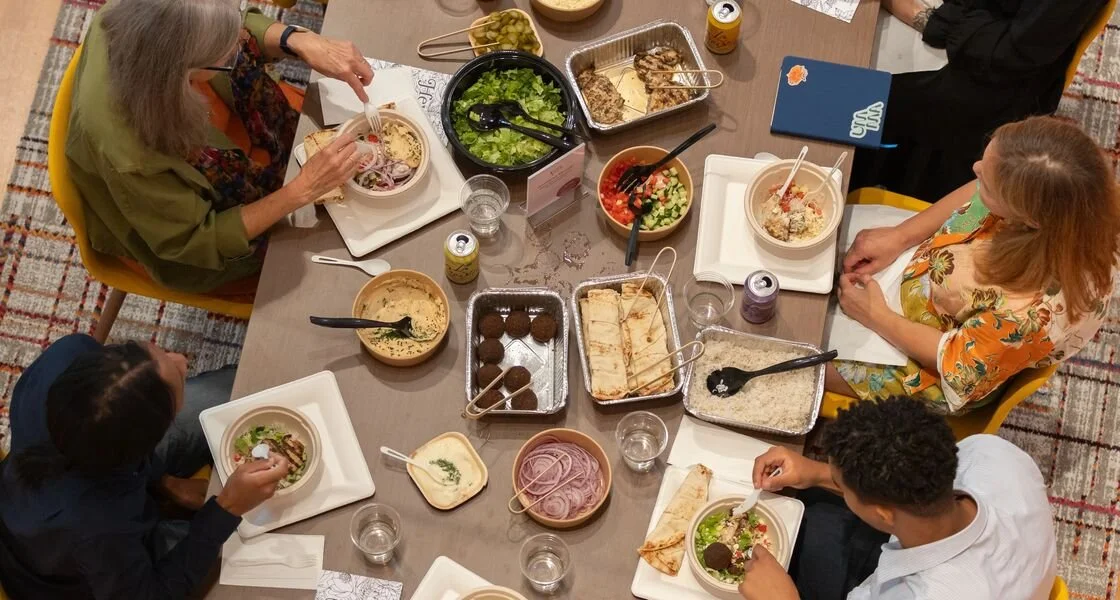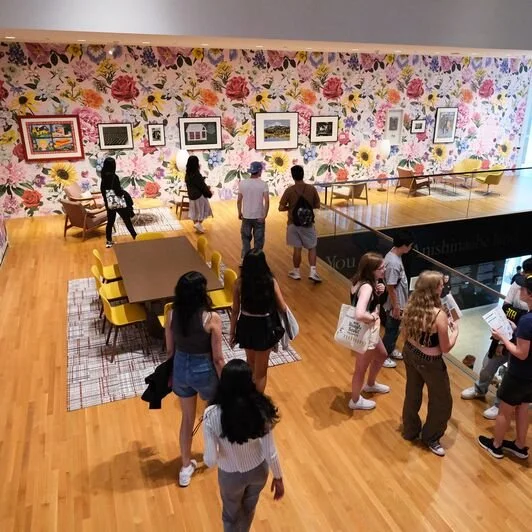Hey, We Need to Talk: Common Sense Diner at UMMA
From the moment you walk into the gorgeous space Philippa Pham Hughes has created at the University of Michigan Museum of Art (UMMA) the vibes are immaculate. Think anthropology meets your grandmother‘s kitchen. Visiting Artist for Art & Civic Engagement at UMMA, Hughes has curated the “Hey, We Need to Talk!” exhibition with extreme intentionality. Every artwork, furniture piece, and even the wallpaper has been thoughtfully selected, each element carrying its own significance.
Upon entering the gallery, visitors are immediately struck by the space’s alluring beauty. As guests approach the artwork and engage with the exhibit, they discover a deeper meaning: each “sitting area” embodies one of the four pillars of flourishing outlined in U-M Professor Jenna Bednar’s journal article – community, sustainability, dignity, and beauty.
The artwork on the walls has been hand selected from UMMA’s collection to prompt conversations about American identity. The exhibition features a custom made wallpaper designed by Detroit-based artist Louise Jones, and illustrates all 50 state flowers. Hughes commissioned Jones to paint each state flower. These floral illustrations were then digitized and transformed into a repeating pattern that wraps the walls of the gallery space. “The flowers are also a metaphor for flourishing,” said Hughes, “Plenty of social science research says: ‘when you feel a sense of awe you feel more connected to your fellow humans,’ and this sense of awe and wonder is critical to connection.”
Every Thursday evening and Friday afternoon, eight individuals from diverse backgrounds gather for a free meal and guided conversation. These intimate gatherings, led by artist Philippa Hughes, bring together participants who self-identify as having different political leanings. Hughes brings together people who self-describe as “left-leaning” and “right-leaning.” The purpose is not to persuade anyone from their position. Instead the goal is simple: to share a meal, ask questions, and listen to each other talk.
The gallery space on the second floor has been completely transformed into a living, “social sculpture” that invites visitors to engage in honest conversations about national identity. Throughout the exhibition, they also host a small group of people each week to meet and talk about what it means to be American over a meal.
Hughes describes herself as a “social practice artist,” cultural strategist, and curator developing relational and creative experiences aimed at strengthening democracy and repairing the social fabric of our country one conversation at a time.
One colleague of Hughes’ – which she refers to as a “social sculptor” – brings her lunch to sit at the communal table and work in the space. As visitors are interacting with the space, U-M students are studying or community members may be passing through after having voted downstairs in the Voting Hub at UMMA. The “social sculptor,” hangs out in the space and strikes up casual conversations about the artwork with visitors: “What brought them into the exhibit today? How did they hear about it?” And she finishes with asking one important question: “What does it mean to be American?”
The exhibition encourages “honest, courageous, common sense discussions.” Hughes facilitates these conversations, but she said she “mostly steps back” underscoring this is “a place to have the conversation, people need to do it on their own.”
Jen, a single older woman from the Ann Arbor area, came to the second Common Sense Diner gathering. She said over and over during the meal: “I’m personally concerned about my safety.” Noting that she currently lives alone and is fearful due to the fact that her nextdoor neighbor displays certain political flags. Later after the meal, she messaged Hughes and said that after her experience at the Common Sense Diner she introduced herself to her neighbor, and after nearly 10 years of living next door to one another they exchanged phone numbers. “In case our houses were ever on fire,” Jen adds.
Another week or two passes, and Jen attends a local community concert and she sees the same neighbor. Except this time when she waves to him, he’s the one that approaches her. “In ten years, we hadn’t exchanged information, so I approached him first. Later he approached me. Less fearful and curious to some degree,” Jen said, “I don’t feel he’ll sneer at me anymore when I see him, but the important part is I don’t fear him anymore and I know I could have a social conversation with him.”
“This is just a little spark,” Hughes notes.
The intentional meals with small groups of people at the Common Sense Diner, where strangers from politically diverse backgrounds gather and talk, all started in Philippa’s own home in 2016.
Hughes says, “in a way the space here at UMMA is a re-creation of my own home.” She describes the meals that she made when she first began hosting these gatherings eight years ago. She said regardless of the meal, she would always end it with a blueberry cherry crisp, because “once you cook it, it becomes purple and gooey inside and that’s a lot like what I’m trying to do here with these conversations.”
What Hughes is doing at U-M with the Common Sense Diner goes beyond sharing a meal. “Although the meal matters,” notes Philippa, “There is a ritual of eating that really matters. One of the greatest challenges is the time constraint [2 hours].”
Hughes says, “There’s an artificiality of the space. How constructed everything is. The wallpaper, the beauty, the sense of awe and wonder, that is meant to accelerate connection. I need people to connect as much as possible, as quickly as possible. I’m very aware of the time it takes to build these relationships.”
Hughes begins each session by discussing the intentional design of the space. After the meal, participants engage in reflection exercises. In these conversations, Hughes is breaking down barriers with strangers who may strongly disagree politically and teaching attendees how to set aside preconceived judgments and have real conversations.
From the moment you meet Philippa, similar to the space she is intoxicating – thoughtful, respectful, honest – and every detail in the space is the same. “I’ve created a space for dialogue and meaningful conversations,” said Hughes, “It’s not complete until that conversation takes place, and the conversation is part of the artwork.”
Hughes is also teaching a course this Fall 2024 at U-M in the Ford School of Public Policy, designed for politically diverse and civic-minded students who are concerned about the deepening divide and fraying social fabric in the US.
The exhibition runs at UMMA now through February 9, 2025. Students, faculty, staff, and community members are all encouraged to participate in the dinners or visit the gallery to engage with the interactive elements.



